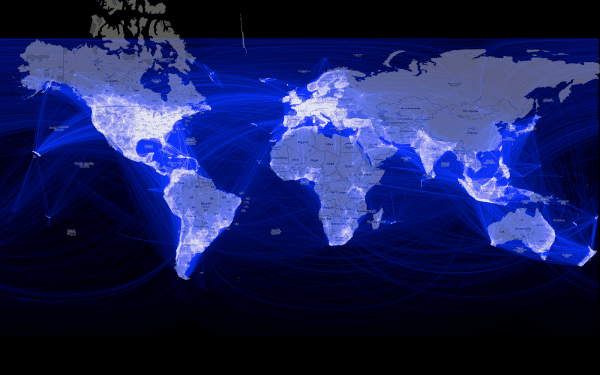Why global marketing theory often differs from reality
 On paper, global marketing is undoubtedly a great concept. The idea of leveraging a marketing strategy across multiple markets seems to be nothing but beneficial. It saves effort and resources, and ensures a high degree of consistency between all in-market branding and activities.
On paper, global marketing is undoubtedly a great concept. The idea of leveraging a marketing strategy across multiple markets seems to be nothing but beneficial. It saves effort and resources, and ensures a high degree of consistency between all in-market branding and activities.
However, the question of whether global marketing works is a frequent conversation topic amongst marketers, and the concept of globally-led marketing resources can be subject to much scepticism.
So, how do you make global marketing work?
Stop the swinging pendulum
Marketing departments, particularly those in larger companies, seem to follow similar pendulum movements. Sometimes central teams are set up to oversee all territories; at other times these same teams are fragmented into regional or local components, each focusing on their specific market(s).
Yet, there are ways to stabilise the pendulum in a happier middle position.
Global marketing can indeed work, drive synergies and economies of scale whilst preserving specific local needs and cultural considerations.
However, as with most marketing approaches, the key to success is a balanced approach. Not all marketing activities can or should be driven from the centre.
Here are some tips for a balanced and successful global marketing approach……
Recommendation 1: Clarify what is driven globally and what is managed locally
A global marketing approach does not mean the absence of local, market-specific plans and initiatives. These should, in fact, be complementary.
Global marketing will typically set the framework and parameters within which local marketing operates, whilst giving in-market teams the freedom to control local success levers.
Some areas of marketing that lend themselves to being led at a global or central level include branding and brand guidelines, strategic marketing planning and budgeting (with autonomy given to markets within their allocated budget), large-scale marketing campaigns, social media strategy and guidelines, research strategy, and global PR.
Other areas best managed locally include local outreach initiatives and more tactical campaigns, local social media channels and PR initiatives, local partnerships and events, etc. Markets need to have some control over the local channels that contribute to driving their success.
In practice, it might be useful to divide your markets into tiers.
A tiered market will help you identify territories that might drive the highest potential returns. It also allows top tier markets to access bigger budgets, giving them autonomy; for example, research into local users’ behaviours to inform product development.
Global and local areas of ownership may differ from company to company. However, it is critical you define the areas clearly to avoid friction and inefficiencies. Take the time to do this upfront - don’t wait until issues start arising.
Recommendation 2: Understand local market needs and develop a collaborative approach
 Too often, operating globally is seen as an excuse to avoid spending time understanding local cultures, customer needs and behaviours, as well as successful and less successful marketing approaches.
Too often, operating globally is seen as an excuse to avoid spending time understanding local cultures, customer needs and behaviours, as well as successful and less successful marketing approaches.
And yet, it is obvious that a US-based customer is likely to be very different from a customer located in India or SEA. Their lives, cultures, and needs are different, so it makes sense they will interact very differently with your products or services.
For a global model to work, global teams need to develop an understanding of local markets and establish a close relationship with local marketing teams.
Gone are the days when global campaigns and strategies were applied in a blanket fashion across all international territories - it simply doesn’t work.
Globally defined initiatives and plans need to factor in a degree of flexibility to cater for cultural differences. A community meet-up, social media competition, or treasure-hunt based campaign might resonate well with some markets, and not at all with others. Celebrity endorsement or participation will only work with … well, actual celebrities. And an Indian celebrity is unlikely to be known in France or Japan. Privacy laws can be very different from country to country too.
So, if you are in a global marketing role:
- Research the markets and take the time to get to know the international teams you will be working with.
- Trust them to be the experts on local customs and users.
- And leverage their knowledge to make your global plans and campaigns a success.
Recommendation 3: Develop and socialise a global marketing plan early (seek feedback)
So, you have established key relationships, researched local markets, and defined global marketing plans which you think accommodate local needs where required.
That’s a great start, but don’t wait for the campaign to begin to validate your assumptions. Socialise these plans with your international teams as soon as possible, seek their feedback and ensure that there are no legal issues to prevent your plans from working in certain markets.
A proactive approach will give you time to adjust and revise your plans in the event of a problem. It will also allow you to get buy-in from your local colleagues. And, after all, a huge part of the success will rest on their shoulders during execution.
Recommendation 4: Manage campaigns like an army operation – plan ruthlessly
As the time for your campaign to kick-off approaches, there are a few key elements to consider to help it succeed; starting with outstanding project planning.
- Appoint a global campaign manager - with responsibility for all communication and coordination around the campaign. Make sure his/her overall accountability is understood by all. Failing to do this will result in cross-communication, misunderstandings and missed deliverables.
- Plan ruthlessly – make sure deadlines, responsibilities and deliverables are clear to everyone involved. Plan your campaign’s official launch at a time and date that works for all the countries in the campaign. And, at every step of the way, get all parties to confirm when deliverables have been completed so you can stay on top of the project at a global level.
- Consider time-zones - your timelines must reflect these so all relevant materials are ready concurrently across all markets. And don’t forget to factor in time for translation, localisation, reviews and iterations.
- Communicate - plans, deliverables and expectations across different channels and multiple times. Touch base with in-country teams regularly to provide support and advice and to stay on top of the campaign as it unfolds.
Recommendation 5: Make sure you track and adjust in real time
 Running a campaign in multiple markets means you will have to be particularly disciplined about tracking results. The campaign manager is a good person to coordinate this.
Running a campaign in multiple markets means you will have to be particularly disciplined about tracking results. The campaign manager is a good person to coordinate this.
Here are a few suggestions:
- Define key metrics and goals at the start of the campaign at both global and market level (clicks, click-through rate%, conversion rate, average customer spend, etc.)
- Get buy-in from in-market teams on these targets. Share these metrics early and share them all. Seeing how each market contributes to the overall success of the campaign might help drive a bit of healthy competition!
- Keep a centralised shared template where market metrics are updated every week/day/any other relevant frequency
- Review metrics weekly with the team, preferably on a call or video call, and take actions to address under-performance. These discussions should be active and vibrant, allowing all local teams to chip in and contribute. This is also a good opportunity to leverage best practice across markets.
Recommendation 6: Consolidate and share insight
Once your campaign comes to an end, make sure you consolidate the insight gained and organise a debrief.
It is important results are both shared upward and reviewed with in-market teams. Discuss what worked, what didn’t; which markets the campaign was most successful in and why. Learnings will be invaluable in planning future activity.
Recommendation 7: Over-communicate
 Effective communication is important at all times, not only when running campaigns.
Effective communication is important at all times, not only when running campaigns.
Being in a global marketing role inevitably means you will be working with colleagues around the globe; most of whom will be sitting thousands of miles away from you. In these circumstances it’s easy to feel disconnected. And, if you are disconnected, so is your strategy, plans and activities.
A critical element that makes global marketing work is the relationship you establish with in-market teams. An open communication channel is vital in developing trust and nurturing these relationships. Regular (video) calls are a great way to keep the teams up-to-date with the latest global plans and changes, as well as to learn about the latest competitive developments in-market, or to discuss new campaign ideas.
Time-zones will make this a challenge, but it can work, and it will pay off. Creating cohesion in the team will go a long way in driving your joined success.
Reap the benefits of operating globally
Yes, global marketing requires some effort to work, but it does have a number of benefits.
Most obviously, it ensures your marketing strategy is applied consistently (but smartly) across territories and it allows you to operate more efficiently through economies of scale.
Beyond this, one of the biggest benefits of operating globally with a local presence is the opportunity it provides to develop a deeper understanding of the markets in which your company operates and their potential. It enables you to prioritise and optimise your efforts and budgets effectively.
And last but not least, it gives you as many territories to test and learn from. For each campaign or activity you run, you will gather feedback and suggestions from a range of markets. This is invaluable insight you can leverage by developing a repository of best practice and ideas which will help drive your long term success.

Thanks to
Isabelle Griffith for sharing her advice and opinions in this post. Isabelle has held a number of positions with leading internet brands Amazon and Yahoo!, managing global teams to deliver cohesive strategies and in-market success, and is now Digital Consultant and Founder at
e-nhance. You can connect with her on
LinkedIn.
With thanks to Paul Butler of Facebook for the global communications map, and
Creative Roots for use of the coke bottles image.







 Thanks to
Thanks to 



